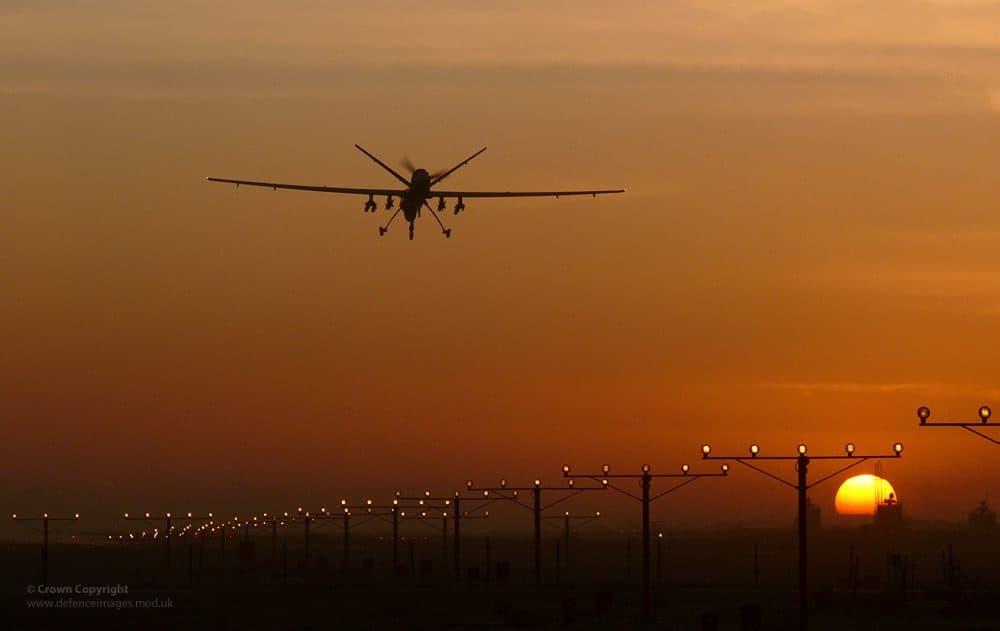
Drone Landing
George Will, the erudite Washington Post commentator, wrote a piercing essay regarding the 10th anniversary of 9/11 saying “I would say that my life has been affected far more by the U.S. response to 9/11 than by 9/11 itself. It’s like the rule with earthquakes. It’s not the earthquake that’s deadly. It’s what happens after the earthquake.”
The earthquake of late has been President Obama’s use of drones for targeted killings – a practice that has been unfavorably compared to the policies of his predecessors in the Bush administration, and which he himself roundly criticized. Peter Baker of the New York Times recently noted just this: “If President Obama tuned into the past week’s bracing debate on Capitol Hill about terrorism, executive power, secrecy and due process, he might have recognized the arguments his critics were making: He once made some of them himself.”
***
In the last two weeks the administration has been put on the defensive after NBC News obtained a secret legal memo justifying drone policy. In it the administration lawyers asserted that it would be lawful to kill a United States citizen under certain circumstances. The legal memo is cold and matter of fact. What is most chilling and disturbing are the numbers of human beings already killed – deceased souls sent to heaven in what this memo asserts is a justifiable way. Most put the number of such at between 3,500 and 4,000.
That we ought to mourn – even work to change – such action is without argument, but neither give us an excuse for not understanding why it is happening. For this I turned to former CIA Director Michael Hayden, who, in a speech two months prior to the presidential election, noted that “targeted killings” had “increased under Obama” because President Obama has closed CIA “black site” prisons and ended torture of detainees – unassailably a good thing. But here lies the problem as well, because capturing terror suspects for imprisonment had became “politically dangerous,” Obama has taken another route: killing them before taking them prisoner.
There have been many and disagreeing reactions, even within the military, to such policies. In an article entitled “Killing Isn’t Cool,” Micah Zenko, a fellow at the Council on Foreign Relations, explores the military’s increased weariness concerning Obama’s targeted killing approach. He quotes a retired captain who observes, “Drones are an example of technology outpacing our morality and thinking.” It’s evident that the American people, military and not, don’t fully feel comfortable with this approach, and Zenko argues that we must rethink our current practices or risk others following in our misguided footsteps.
The unnerving continuity and the lagging moral case for both our current and previous administrations’ terror policy leaves much for want. Clive Stafford Smith’s insightful article, in the British newspaper The Guardian, ripped the administration, arguing that the immoral collateral damage caused by drone strikes is actually fomenting radicalism. And he’s not alone. There seems to be growing consensus and critique over how “targeted” these targeted drone strikes really are.
***
This leaves us with a drone policy that is secretive, ensconced within the executive branch of government, lacking in checks and balances, and resting on flimsy moral ground. Even more, our generation is now being left with a false choice: secret prisons and torture, or extra-legal targeted warfare that breeds discontent and always seems to cause collateral damage. I for one am content with neither of these choices, and partially (although not wholly), because these choices and the current use of drones utterly prevents us from staking a claim to the moral high ground.
Gideon Rose’s interview with General Stanley McChrystal says something similar in its terribly chilling questioning of whether morality can and ought to be used as a military tool. McChrystal states,
“And although to the United States, a drone strike seems to have very little risk and very little pain, at the receiving end, it feels like war. Americans have got to understand that. If we were to use our technological capabilities carelessly—I don’t think we do, but there’s always the danger that you will—then we should not be upset when someone responds with their equivalent, which is a suicide bomb in Central Park, because that’s what they can respond with.”
Yes, that is a General in our own military arguing that a higher moral purpose ought to be a bigger part of our arsenal than drones are. General McChrystal is asking us whether or not it’s acting rightly that will best prevent terrorist responses to our current drone warfare – and I think he’s responding in the affirmative.
Whatever the argument has been, the administration has hit a nerve in this country as well as in those on the receiving end of drone strikes. Perhaps George Will was right when he called us a hollow generation bent not on great ideas but on safety and security. This we certainly ought to change.



